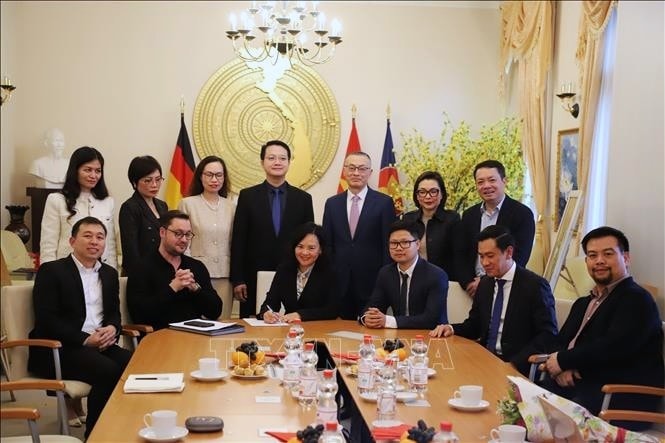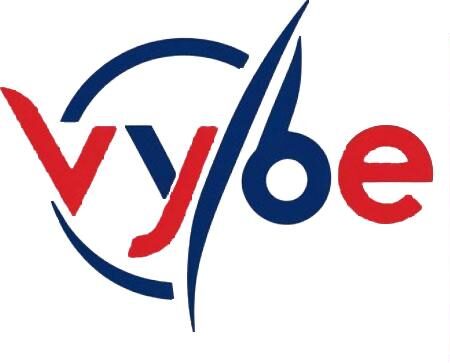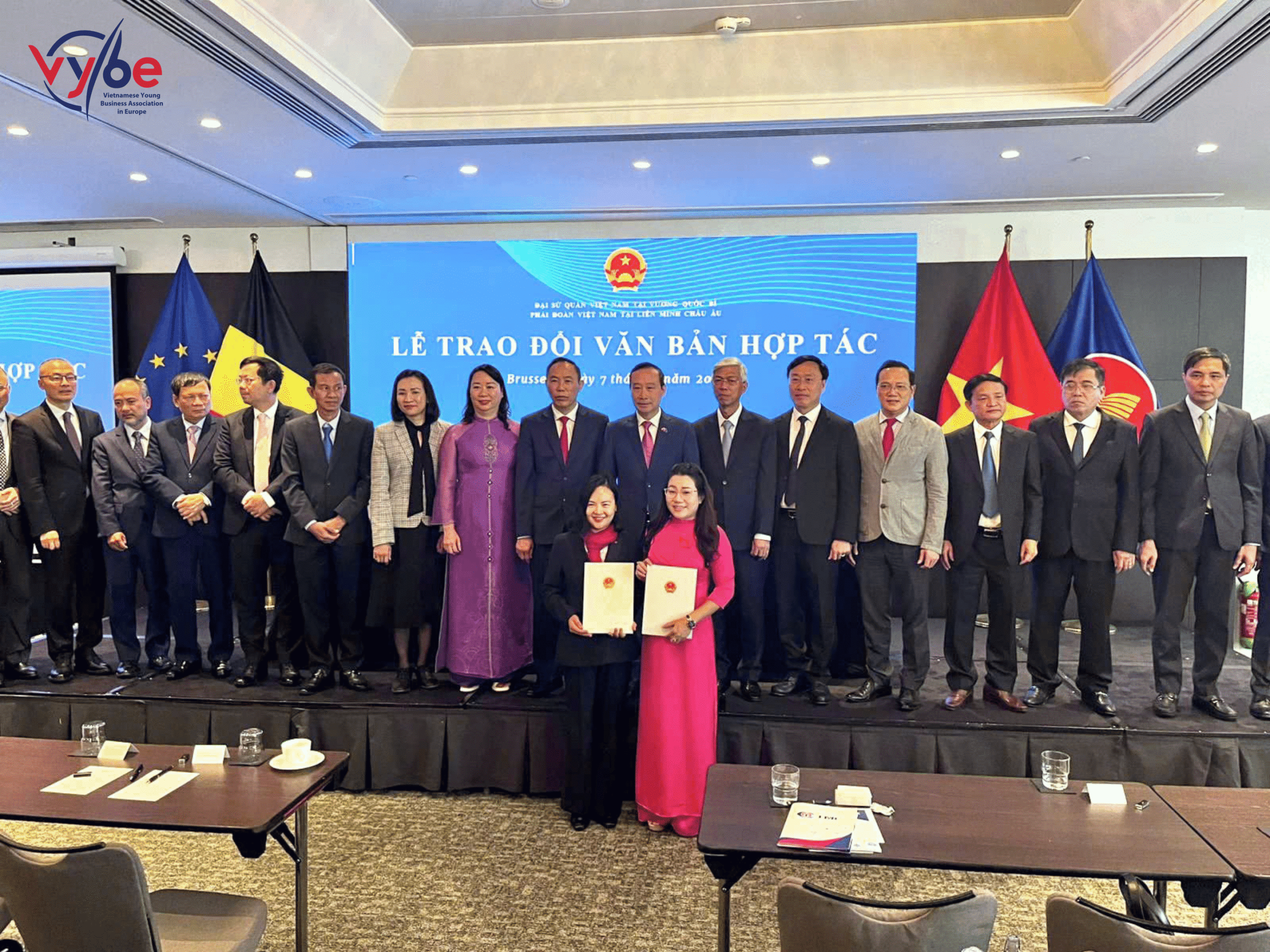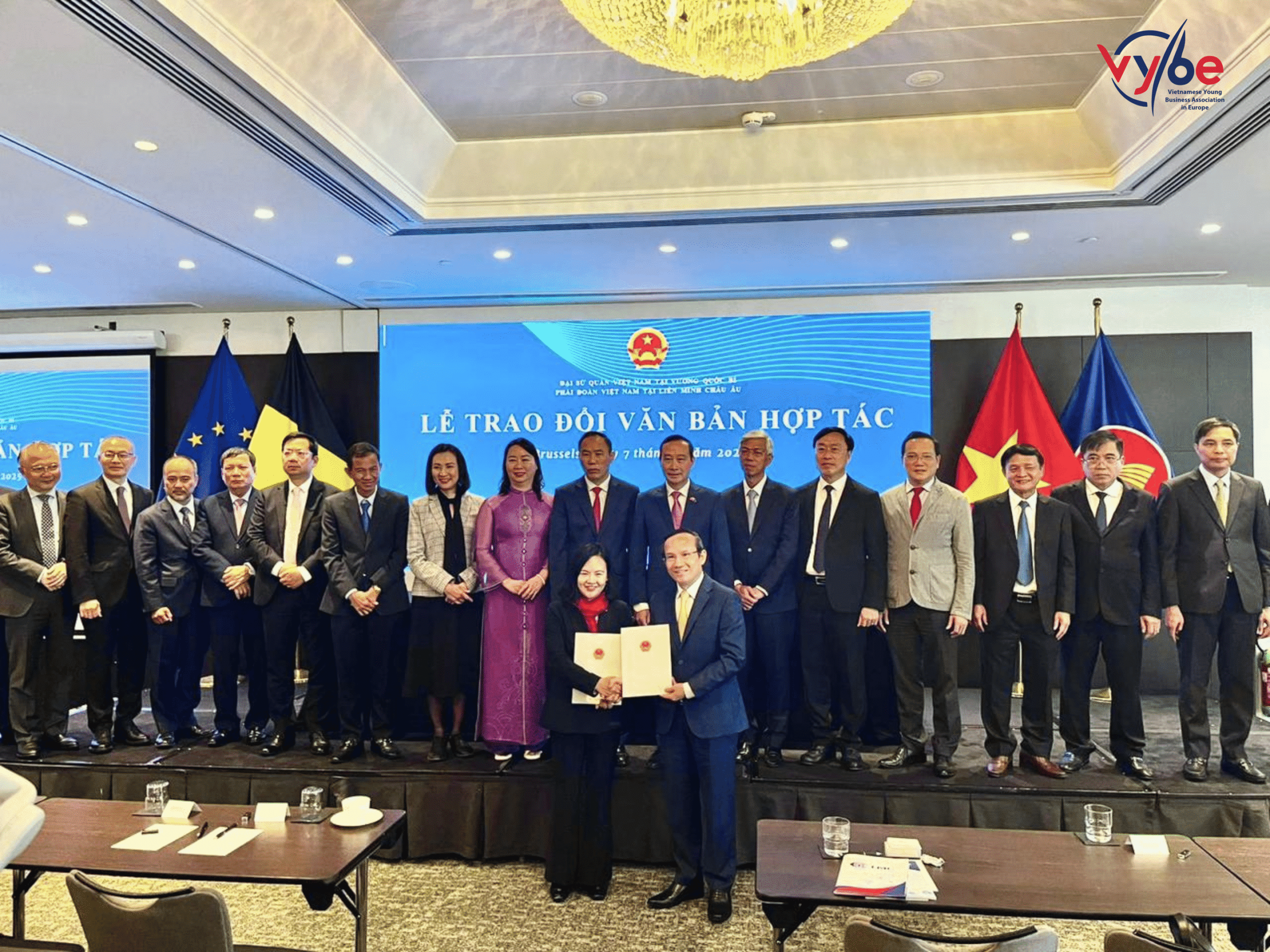Vietnam is demonstrating a long-term vision in strengthening ties with the European Union (EU)—one of its leading trade partners. In 2024, Vietnam-EU bilateral trade reached $68 billion, marking a 16% increase within just 12 months, solidifying the EU’s position as Vietnam’s second-largest export market.

EU-Vietnam trade relations continue to expand despite global economic challenges. (Photo: Nhandan.vn)
Confidence among European businesses in Vietnam remains high. During a meeting with Prime Minister Pham Minh Chinh on March 2, EuroCham Vietnam Chairman Bruno Jaspaert described Vietnam as the “second home” for many European enterprises.
In the EU market, the presence of Vietnamese businesses is becoming increasingly prominent. Alongside well-established industry leaders, startups and young entrepreneur communities are also making a positive impact, with examples like Linsan Imex (Czech Republic) and Databuckets (Ireland). These companies are not only achieving success in key markets such as Germany, France, and the Netherlands but also aspire to expand across Europe, building a cross-border network of partners and customers.
“Vietnamese young business across Europe and the world are highly talented, but the lack of connectivity remains a challenge – an essential factor in building a strong business community. This is one of the key reasons behind the establishment of the Vietnamese Young Business Entrepreneurs in Europe (VYBE),” said Ms. Tran Ha My, EU representative of Sovico and President of VYBE, in an interview with Business Forum.
A “Young Building Block” and the Mission of Connectivity
In Berlin, Germany, under the witness of Vietnamese Ambassador to Germany, H.E. Vu Quang Minh, the VYBE leadership team shared their vision of establishing a business bridge across continents. The association’s mission goes beyond just promoting trade – it also focuses on technology transfer and attracting foreign direct investment (FDI) to Vietnam. These efforts are expected to contribute to Vietnam’s goal of becoming a high-income nation by 2045, in line with the government’s vision.
Ms. Tran Ha My emphasized the ambition to “lay the foundation for a future where Vietnamese talents stand on par with developed nations,” thereby elevating Vietnam’s intellectual capital and technological capabilities on the global map.
As global supply chains undergo restructuring and Southeast Asia emerges as a new focal point, stronger connections between Vietnamese businesses in Europe and those in Vietnam could provide a significant competitive advantage – especially when compared to traditional competitors such as China, India, and Thailand.

The Vietnamese Young Business Association in Europe was officially launched on February 28, 2025 in Europe. (Photo: TTXVN)
Mr. Do Tien Thinh, Deputy Director of the National Innovation Center (NIC), acknowledged that the establishment of VYBE aligns with “a new era of development for Vietnam.” He expressed hope that young Vietnamese entrepreneurs in Europe would serve as pioneers in addressing innovation challenges for both markets.
“NIC strongly hopes that the association will deliver real value to its members, enabling them not only to grow their businesses in Europe but also to expand globally and eventually reinvest in Vietnam,” Mr. Thinh said.
Long-standing connectivity challenges – such as geographical distance, cultural differences, and language barriers – have caused many Vietnamese business groups to operate in isolation, making it difficult to develop into large-scale business clusters. However, with stronger integration platforms and the sharp business mindset of young entrepreneurs, this reality is gradually shifting, creating a significant opportunity for Vietnam to establish a strong trade and investment hub in Europe.
Building High-Value Partnerships with Europe
Ambassador Vu Quang Minh affirmed that this is a golden opportunity for VYBE to leverage its youthful energy and become a key bridge between Vietnam and the EU – especially as the two sides celebrate 35 years of diplomatic relations and move toward upgrading their ties to a Comprehensive Strategic Partnership. In addition to connecting Vietnamese businesses already operating in Europe, the association is also working to engage and collaborate with Vietnamese enterprises looking to expand into the EU market.
Opportunities in the European market remain abundant compared to Vietnam’s production capacity and industry transformation speed. In the agriculture sector, both sides possess unique strengths that complement each other. Vietnam boasts a diverse tropical agriculture and extensive experience in exporting rice, coffee, and seafood, while Europe is recognized as a leader in high-tech applications and smart agricultural solutions. Additionally, Europe places great emphasis on sustainability and reducing carbon emissions, creating potential synergies for deeper collaboration.
The global smart agriculture market is projected to exceed $20 billion by 2025. Recognizing this opportunity, Vietnam is gradually adopting smart farming, precision agriculture, and supply chain management technologies to enhance product quality and added value. At the same time, these efforts aim to meet the stringent environmental and food safety standards of international markets, including Europe.
Beyond traditional industries, European businesses are increasingly interested in Vietnam’s rapidly growing technology sector. By 2030, Vietnam aims for its digital economy to contribute at least 30% of GDP, driven by artificial intelligence (AI), big data, and semiconductor technology. Meanwhile, the EU has recently launched the InvestAI initiative, aiming to mobilize over €200 billion for AI investments. The synergy between Europe’s demand for technological innovation and Vietnam’s increasingly skilled tech workforce presents a compelling win-win opportunity for collaboration.



